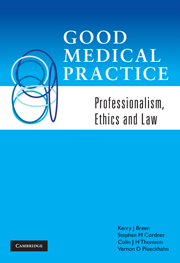Book contents
- Frontmatter
- Foreword
- Contents
- List of tables
- Preface
- Preface to the 1997 edition
- Acknowledgments
- About the authors
- Table of cases
- Table of statutes
- 1 Ethical principles for the medical profession
- 2 Ethical and legal responsibilities of medical students
- 3 Communication skills
- 4 Consent and informed decision making
- 5 Confidentiality, privacy and disclosure
- 6 Medical records, reports and certificates
- 7 Negligence, professional liability and adverse events
- 8 The regulation of the medical profession
- 9 Health care complaints systems
- 10 The doctor and sexual boundaries
- 11 Personal health of the doctor: illness and impairment
- 12 Maintenance of professional competence
- 13 Ethics and the allocation of health-care resources
- 14 The Australian health-care system
- 15 The doctor and interprofessional relationships
- 16 Entering and leaving practice and practice management
- 17 Clinical research
- 18 Prescribing and administering drugs
- 19 Diagnosing and certifying death and the role of the coroner
- 20 Births, reproductive technology, family law and child protection
- 21 Termination of pregnancy and related issues
- 22 Withholding or withdrawing treatment in the seriously or terminally ill
- 23 The law and the mentally ill
- 24 The law and courts of law in Australia
- 25 Medico-legal examinations and reports, court procedures and expert evidence
- 26 Other legislation relevant to medical practice
- APPENDIX 1 AMA CODE OF ETHICS – 2004
- Index
- References
26 - Other legislation relevant to medical practice
- Frontmatter
- Foreword
- Contents
- List of tables
- Preface
- Preface to the 1997 edition
- Acknowledgments
- About the authors
- Table of cases
- Table of statutes
- 1 Ethical principles for the medical profession
- 2 Ethical and legal responsibilities of medical students
- 3 Communication skills
- 4 Consent and informed decision making
- 5 Confidentiality, privacy and disclosure
- 6 Medical records, reports and certificates
- 7 Negligence, professional liability and adverse events
- 8 The regulation of the medical profession
- 9 Health care complaints systems
- 10 The doctor and sexual boundaries
- 11 Personal health of the doctor: illness and impairment
- 12 Maintenance of professional competence
- 13 Ethics and the allocation of health-care resources
- 14 The Australian health-care system
- 15 The doctor and interprofessional relationships
- 16 Entering and leaving practice and practice management
- 17 Clinical research
- 18 Prescribing and administering drugs
- 19 Diagnosing and certifying death and the role of the coroner
- 20 Births, reproductive technology, family law and child protection
- 21 Termination of pregnancy and related issues
- 22 Withholding or withdrawing treatment in the seriously or terminally ill
- 23 The law and the mentally ill
- 24 The law and courts of law in Australia
- 25 Medico-legal examinations and reports, court procedures and expert evidence
- 26 Other legislation relevant to medical practice
- APPENDIX 1 AMA CODE OF ETHICS – 2004
- Index
- References
Summary
The bulk of state and Commonwealth legislation that is of most direct and frequent relevance to medical practice has been addressed in previous chapters. The differences between the jurisdictions are more often in detail than in principle. This final chapter summarises some further legislation that may involve practising doctors and is written mainly to highlight the principles involved in these Acts. Doctors wishing to seek more detailed advice concerning their responsibilities under the legislation should consult the department or statutory body established to administer the relevant Act. These additional legal responsibilities emphasise that the community places great trust in the professionalism of doctors in such roles as:
the provision of objective reports and certificates in relation to disabilities, injuries and accidents
the notification of authorities where individuals or the community are at risk
assisting in the care and protection of the disabled
exercising a public role as a person of independence and reliability
meeting specific obligations as laid down in other Acts of Parliament.
Failure by a doctor to fulfil these responsibilities will diminish the community's trust in the medical profession and may lead to censure of a doctor by a medical board. In some instances, doctors may face fines or even terms of imprisonment for failing to meet these responsibilities without adequate cause.
SOCIAL SECURITY LEGISLATION
Under social security legislation, people with illness or injury leading to temporary or permanent disability with incapacity to work are entitled to social security income in the form of sickness benefits, a disability support pension (DSP) or other payments.
- Type
- Chapter
- Information
- Good Medical PracticeProfessionalism, Ethics and Law, pp. 386 - 398Publisher: Cambridge University PressPrint publication year: 2010



